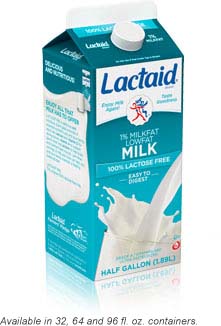As you could imagine, eating out, grocery shopping, and going to social gatherings all became a chore, especially since most people and eateries have never heard of milk protein intolerance before. They were always quick to correct me, "don't you mean lactose intolerant?" No. I don't.
Without getting too technical, here are the major differences between the three:
- Lactose intolerance is the body’s inability to digest the milk sugar, lactose. People with this condition do not create enough of the enzyme lactase.
- CMPA (the allergy) is a person's immunological response to ingesting the proteins of milk (casein and whey). This is an allergy in every sense of the word, causing anything from hives to anaphylaxis.
- CMPI (the intolerance) is when the person cannot digest the milk protein, leading to uncomfortable symptoms and potentially long-term gastrointestinal tract damage.
 Lactaid- one of many lactose-free products
Lactaid- one of many lactose-free products People with lactose intolerance can take a lactase supplement to help digest milk sugars without uncomfortable digestive side effects. Most people who are lactose intolerant can withstand a certain threshold of lactose without symptoms, and can even eat lactose-low foods such as yogurt or hard cheese.
People with CMPI and CMPA are not as lucky. Not only do you need to be careful of ingesting the milk protein itself, you also need to be very aware of cross-contamination with other products containing milk proteins. This also means not eating anything out of a fryer! (see... even french fries at a restaurant become problematic). To make it worse, there are SO many uses for milk proteins, including as a preservative. I remember one brand of canned tomatoes I couldn't buy because milk proteins were in there!
Perhaps worst of all, there are dozens of different names for milk. A great tool to decipher all of these milk-names can be found on Godairyfree.com. I love this site because it also shows other potential situations where milk proteins can be found.
Do you have a milk related intolerance or allergy? If so, what tips and tricks can you share? Feedback is always welcome!
Bahna, S. (2002). Cow's milk allergy versus cow milk intolerance. Annals of Allergy, Asthma, Immunology, 89(6 Suppl 1), 56-60.

 RSS Feed
RSS Feed